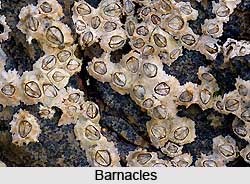 Barnacles are closely allied to water-fleas and copepods and when young are free-swimming with three pairs of appendages. While still free-swimming they develop additional limbs, feed, moult and change their forms. Later they attach themselves by their first pair of antennae to rocks or timber and after a resting stage become shelled adults. The shell is in divisions which overlap and when closed are thoroughly protective. A barnacle is therefore described as a kind of shrimp standing on its head, attached to some support and with its legs projecting upwards. These legs serve to produce currents in water enabling the animal to respire and capture food.
Barnacles are closely allied to water-fleas and copepods and when young are free-swimming with three pairs of appendages. While still free-swimming they develop additional limbs, feed, moult and change their forms. Later they attach themselves by their first pair of antennae to rocks or timber and after a resting stage become shelled adults. The shell is in divisions which overlap and when closed are thoroughly protective. A barnacle is therefore described as a kind of shrimp standing on its head, attached to some support and with its legs projecting upwards. These legs serve to produce currents in water enabling the animal to respire and capture food.
There are two kinds of barnacles - stalked or Goose barnacles and unstalked or Acorn barnacles. Lepas is an example of the former and Balanus of the latter and both the kinds of barnacles when adults, measure three to five centimetres across. Barnacles are so abundant and so widely distributed that all rocks on the littoral, pilings, shelled animals like molluscs and crabs, the keels and hulls of ships and canoes are all encrusted by these crustaceans. In the Goose barnacles, found in clusters on logs of driftwood or on the hulls of ships after long voyages, their fleshy stalks grow from 2.5 centimetres to more than thirty centimetres long.
This article is a stub. You can enrich by adding more information to it. Send your Write Up to content@indianetzone.com






































